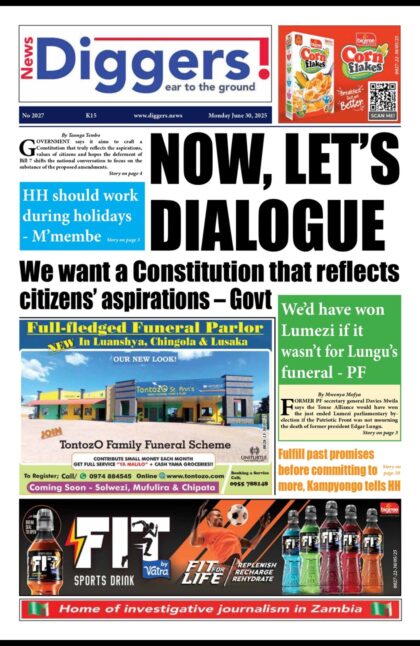The Lusaka High Court has refused to stay criminal proceedings in which New Labour Party leader Fresher Siwale is accused of defaming the President, pending review of magistrate Alice Walusiku’s refusal to refer the case to the High Court for Constitutional reference.
Lusaka High Court judge Sharon Newa has further set aside Siwale’s application to review the magistrate’s decision to refuse to stay the proceedings pending his appeal, stating that criminal proceedings before the Subordinate Court can only be reviewed after they are concluded.
In the case before the Lusaka Magistrates’ Court, Siwale is charged with defamation of the President.
It is alleged that on April 22, 2018, Siwale with intent to bring the President’s name into ridicule, said President Edgar Lungu is not Edgar Chagwa Lungu but Jonathan Mutawale and that he should be arrested for having three National Registration Cards, calling him “an identity thief”.
Several witnesses have testified in the matter, among them President Lungu’s former teacher Nelsen Dhliwayo, a 76-year-old retiree and small-scale farmer.
Dhliwayo, who is still on stand pending cross examination, had testified that President Lungu was one of his brightest pupils who used to get distinctions in the weekly tests.
In October, magistrate Walusiku refused to halt the criminal proceedings before her, saying no interlocutory application can stay proceedings in a criminal matter.
Following the court’s refusal to stay the proceedings pending review application, Siwale went to the High Court seeking an order to stay and review his application.
Siwale applied for an interim order in the Lusaka High Court to stay the criminal proceedings in the Lusaka Magistrates’ Court, pending hearing of an application to review the court’s refusal to refer the matter to the High Court for Constitutional reference.
In his affidavit in support of ex parte summons for review, Siwale stated that in the absence of the stay of the criminal proceedings, it was highly likely that he may be convicted on an offence that may subsequently be declared unconstitutional or the proceedings may otherwise come to a close and the appeal rendered academic.
The state, however, through a Mr M.C Chipawa, a state advocate at National Prosecutions Authority, raised preliminary issues and asked the court to set aside the application.
Chipawa raised issues of whether the court had jurisdiction to hear the application for stay of the proceedings before the Subordinate Court as well as review the trial magistrate’s decision to refuse to stay criminal proceedings.
Chipawa also challenged the manner in which the application for review was made before court, stating that section 338 of the Criminal Procedure Code Chapter 88 of the Laws of Zambia does not envisage review being instituted by summons and where criminal proceedings are on-going, the section provides that the court, on its own motion, may call for the record, and this was after the matter had been concluded.
One of Siwale’s lawyers, Keith Mweemba, submitted that the State’s arguments were misplaced and urged the court to grant the application.
But in her ruling, judge Newa said the revisionary powers vested in the High Court in sections 337, 338 and 339 of the CPC can only be exercised where the proceedings before the Subordinate Court have been concluded, as there can be no appeal against any interlocutory decision of the Subordinate Court.
“In the matter at hand, there are criminal proceedings that are ongoing before the Subordinate Court and what was sought to be reviewed was an order refusing to stay the criminal proceedings pending the review,” she said.
Judge Nawa said she could not be moved to review any order made in on-going proceedings, as the spirit of Section 337 and 338 of the Criminal Procedure Code does not so provide.
“The preliminary issues succeed, and the application to stay the criminal proceedings pending review and the application to review the magistrate’s decision to refuse to stay the proceedings pending appeal are hereby set aside. Leave to appeal is granted,” ruled judge Newa.


















